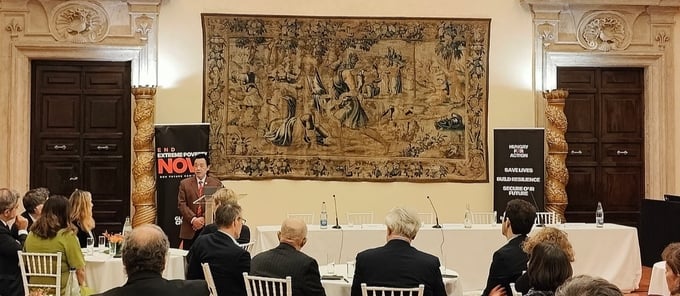June 15, 2025 | 22:18 GMT +7
June 15, 2025 | 22:18 GMT +7
Hotline: 0913.378.918
June 15, 2025 | 22:18 GMT +7
Hotline: 0913.378.918

FAO Director-General QU Dongyu delivers a keynote speech at the high-level event ''Unifying Global Voices: Making Food Security a Priority in 2024'".
At a High-Level event organized by the Permanent Delegation of Brazil to the United Nations Rome-based agencies and Global Citizen, FAO Director-General QU Dongyu highlighted today the urgent need to prioritize food security and climate action in 2024 and reaffirmed FAO’s support to the G20 Presidency which Brazil currently holds.
In a keynote speech, Qu underlined the grim reality of global hunger, reminding that 735 million people faced chronic hunger in 2022. The Director-General emphasized the interconnectedness of conflicts, climate extremes, and economic crises, stressing their disproportionate impact on food security and nutrition for the poor and vulnerable.
The high-level event, held at the Brazilian Embassy in Rome, was hosted by the Ambassador of Brazil to Italy Renato Mosca; the Brazilian Ambassador to the UN Rome Based Agencies Carla Carneiro, and the Global Citizen Vice President of Global Policy and Advocacy Friederike Roder.
It also had the participation of other leaders from the UN Rome Based Agencies: Alvaro Lario, President of the International Fund for Agricultural Development (IFAD) and Carl Skau, Deputy Executive Director and Chief Operating Officer, World Food Programme (WFP).
A high-level panel focused on how the G7 and G20 presidencies, Italy and Brazil respectively, prioritise food security and agricultural adaptation, including with the recently announced G20 Global Alliance Against Hunger and Poverty to be launched in November.
Among the panelists were the Director General for Development Cooperation and Special Envoy for Food Security of the Italian Ministry of Foreign Affairs, Stefano Gatti; and the Permanent Representative to the UN Agencies in Rome of the Republic of South Africa, Nosipho Nausca-Jean Jezile.
“FAO is pleased with the fruitful synergy and effective collaboration with the Government of Brazil, and we continue to be committed to providing our full technical and professional support for a successful G20 under Brazil’s Presidency”, the FAO Director-General said.
Linking poverty and hunger, Qu also pointed out the alarming connection between inequality and various forms of malnutrition, contributing to a triple burden. He urged the expansion of social protection programs, citing Brazil as a successful example with its conditional cash transfers. However, he stressed the need for innovation in social protection, particularly in response to climate shocks.
Looking towards long-term solutions, the Director-General outlined the need for investments in infrastructure, digitalization, innovation, and technologies, along with a crucial focus on human capital through improved education and health services.
“Significantly increased and more targeted investment to transform global agrifood systems will be necessary to reduce hunger, bring people out of poverty and promote sustainable agricultural production,” he explained, noting that transforming agrifood systems would require an investment of $4 trillion from now to 2030 in low- and middle-income countries.
Qu stressed the importance of increased investments for a more diverse and productive agricultural sector that promotes nutritious foods and highlighted the sector’s role in addressing all dimensions of sustainable development, including climate action.
The Director General explained that although agrifood systems are responsible for about 30% of greenhouse gas emissions transforming them can improve their efficiency and make them more inclusive and resilient.
He cited the recently launched Global Roadmap for Achieving SDG2 without breaching the 1.5C threshold as an innovative plan and concrete package of solutions to support achieving Zero Hunger and accelerating climate actions.
“The roadmap could also act as a catalyst for increased financing”, he said.
(FAO)

(VAN) Extensive licensing requirements raise concerns about intellectual property theft.

(VAN) As of Friday, a salmonella outbreak linked to a California egg producer had sickened at least 79 people. Of the infected people, 21 hospitalizations were reported, U.S. health officials said.

(VAN) With the war ongoing, many Ukrainian farmers and rural farming families face limited access to their land due to mines and lack the financial resources to purchase needed agricultural inputs.

(VAN) Vikas Rambal has quietly built a $5 billion business empire in manufacturing, property and solar, and catapulted onto the Rich List.

(VAN) Available cropland now at less than five percent, according to latest geospatial assessment from FAO and UNOSAT.

(VAN) Alt Carbon has raised $12 million in a seed round as it plans to scale its carbon dioxide removal work in the South Asian nation.

(VAN) Attempts to bring down the price of the Japanese staple have had little effect amid a cost-of-living crisis.